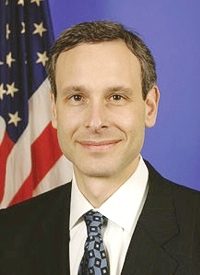
An atheist group has turned its attention to the federal tax code, but not because of its astronomical size and scope. Instead, the Freedom from Religion Foundation is concerned with what it alleges to be an unconstitutional exemption for Christian ministers.
The Freedom from Religion Foundation, which typically launches battles to ensure the oft-used maxim of “separation of church and state,” has joined three of its officers in filing a lawsuit against Treasury Secretary Timothy Geithner and IRS Commissioner Douglas Shulman (left).
A portion of the lawsuit reads:
Section 107 has the effect of fostering governmental entanglement with religion, precisely in order to limit the tax break provided by §107 to religious clergy; the IRS must make complex, intrusive and subjective inquiries into religious matters when applying §107 in order to limit its preferential scope to ministers of the gospel.
Section 107, both on its face and as administered by the defendants Geithner and Shulman, violates the Establishment Clause of the First Amendment, and therefore the defendants should be enjoined from any further allowance of such tax benefits exclusively to ministers of the gospel.
The group contends that the housing exemptions offered to Christian ministers in the tax code are unconstitutional in that they violate the establishment clause of the First Amendment. The lawsuit indicates that millions of dollars continues to go untaxed as a result of those exemptions.
Current tax law permits clergy to be paid in tax-free dollars. Members of clergy are also permitted to deduct mortgage interest and property tax payments. These exemptions were approved in 1954.
The group also contests the notion that the IRS must investigate a person’s individual beliefs and religious practices to ensure that he does in fact qualify for tax exemptions. The Blaze reports, “Since applying to receive minister exemptions is complex, opponents claim that it creates “excessive entanglement” between church and state — something foundations like Freedom From Religion refuse to tolerate.”
The Christian Post explains further, “What makes the housing allowance even more offensive to FFRF is that housing payments for ministers preaching the Gospel also are exempt from most states’ income tax.”
Economist Thomas E. Woods, Jr., observes, however, that tax breaks of any variety should be embraced, not closed, and expanded, not minimized. He writes in Meltdown, “A ‘tax break’ is an oasis of freedom to be broadened, not a loophole to be closed. Instead, they should be extended.”
Texas Republican Representative and presidential hopeful Ron Paul takes this notion a step further. Paul has argued in favor of repealing the income tax altogether, a move which would effectively put an end to all debates regarding tax breaks and exemptions. Paul is a leading advocate of a Liberty Amendment to the Constitution, which would abolish all income and death taxes. He also seeks to close the Internal Revenue Service, and repeal all capital gains taxes, which he condemns as a punishment for success.
For now, however, the tax code remains in place, and therefore, the FFRF will forge ahead with its lawsuit. However, John Witte, director of the Center for the Study of Law and Religion at Emory University, believes the case will not go very far.
“This is a pretty easy case,” he notes. “I think the Supreme Court has made it clear that tax exemption cases are for the legislature, not for the courts, to decide.”




